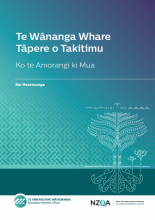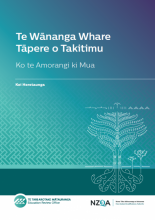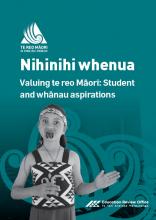- Topics: East Coast region, Māori Education Evaluation, Mental health, State schools, Teacher aides, Te Pou Mataaho | Evaluation and Research Māori
- Published: 08 Jul 2021
Te Kura Huanui : Ko ngā kura o ngā ara angitu
I roto i Te Kura Huanui: Ko ngā kura o ngā ara angitu, ko ngā uiui me ngā whānau Māori, kaiārahi, kaiako, kaimahi, kaumātua hoki e tūhura ana i te ngākau titikaha o ngā hapori ki te whakarauora, ki te whakapakari hoki i te reo Māori me ngā tikanga Māori mō ā rātou mokopuna, tamariki, uri whakatupu anō hoki.
- Published: 08 Jul 2021
Te Kura Huanui: The treasures of successful pathways
Te Kura Huanui: The treasures of successful pathways and supporting documentaries explore the Māori-medium education pathway, through a rich collection of interviews and research conducted in partnership with early founders, whānau, leaders, graduates, kaiako, kaimahi and kaumatua.
- Published: 06 May 2021
Te Muka Here Tangata – The strand that binds people
This case study explores the impact of the 2020 Covid-19 events on Māori learners in English-medium schools, and the response of leaders, schools and communities in the Bay of Plenty and East Coast regions.
- Published: 22 Apr 2021
Science in secondary schools: a guide for leaders
To support leaders and teachers to review and strengthen the science learning opportunities they provide, ERO explored the strategies and approaches that a selection of schools had taken to increase students’ engagement in science. This short guides draws on this work to help secondary school leaders think about how they can support stronger science teaching and learning in their school.
- Published: 21 Apr 2021
Science in secondary schools: a guide for teachers
To support leaders and teachers to review and strengthen the science learning opportunities they provide, ERO explored the strategies and approaches that a selection of schools had taken to increase students’ engagement in science. This short guides draws on this work to help secondary school teachers think about how they can support stronger science teaching and learning in their school.
- Published: 20 Apr 2021
Science in primary schools: a guide for leaders
To support leaders and teachers to review and strengthen the science learning opportunities they provide, ERO explored the strategies and approaches that a selection of schools had taken to increase students’ engagement in science. This short guides draws on this work to help primary school leaders think about how they can support stronger science teaching and learning in their school.
- Published: 19 Apr 2021
Science in primary schools: a guide for teachers
To support leaders and teachers to review and strengthen the science learning opportunities they provide, ERO explored the strategies and approaches that a selection of schools had taken to increase students’ engagement in science. This short guides draws on this work to help primary school teachers think about how they can support stronger science teaching and learning in their school.
- Published: 12 Apr 2021
Science in New Zealand schools and early childhood services - series summary
Science is important – we rely on science and scientific thinking in almost every endeavour in our modern society. High quality science education at school is essential for learners who want a career in science, but it is also important for all learners to help them understand the scientific issues that whānau, communities, and nations face. Issues such as climate change, healthy living, and innovation all depend on science.
- Published: 19 Jan 2021
Te Kahu Whakahaumaru – Ngā mahi a te rangai mātauranga Māori (English)
Te Pou Mataaho, ERO’s evaluation and research group, and Te Uepū ā Motu, ERO’s national evaluation and review team, pursued this evaluation to provide an evidence base about the initial impacts of Covid-19 on Māori-medium education and how the sector responded.
- Published: 19 Jan 2021
Te Kahu Whakahaumaru – Ngā mahi a te rangai mātauranga Māori (Māori)
I whāia tēnei arotake e Te Pou Mataaho, te rōpū arotake, rangahau hoki a Te Tari Arotake Mātauranga me Te Uepū ā-Motu, te rōpū arotake ā-motu a Te Tari Arotake Mātauranga, ki te whakaputa i tētahi kohinga taunakitanga e kitea ai ngā pānga tōmua o te Mate Korona ki te rāngai mātauranga reo Māori, me ngā rautaki i whāia ai e taua rāngai.
- Published: 10 Dec 2020
Te Kahu Whakahaumaru: Māori continue to show resilience across Māori-medium education
In Aotearoa, Māori-medium education experienced significant disruption when the outbreak of Covid-19 forced kura to close their doors, and whānau and kaiako to adjust to home schooling and distance learning. Among the many challenges were access to technology and resources with Māori communities among the most affected.
- Published: 10 Dec 2020
E whakatinana tonu nei te rāngai mātauranga reo Māori i te manawanui
I Aotearoa nei, i tino raru te rāngai mātauranga reo Māori i te horapatanga o te Mate Korona, i kati ai ngā tatau o ngā kura, i mate ai hoki ngā whānau me ngā kaiako ki te tīni i ā rātou mahi ki te whakaako ki te kāinga me te ako tawhiti.
Ko tētahi raru i roto i te huhua, ko te korenga o ngā taputapu matihiko me ngā rauemi, ka mutu ko ngā hapori Māori ērā i rongo i te korekore rawa atu nei.
- Published: 15 Sep 2020
Nihinihi Whenua – Valuing te reo Māori: Student and whānau aspirations
This report provides a snapshot of student and whānau perspectives on the teaching of te reo Māori. It follows the June publication of Te Tāmata Huaroa, which provides a review of the current status of te reo Māori in English medium school settings.
- Published: 18 Jun 2020
Te Tāmata Huaroa: Te Reo Māori in English-medium Schooling
This report gives a snapshot of the current provision of te reo Māori teaching and learning in a representative sample of English-medium primary and secondary schools. The education sector is seen as an important lever in the Government’s Maihi Karauna strategy for language revitalisation.
- Published: 25 Sep 2018
Provision for Students in Activity Centres
There are 14 activity centres in New Zealand that cater for secondary school students (Years 9 ‑ 13) who are at risk of disengaging from mainstream schooling and at risk of low educational, social and vocational outcomes. Activity centres are established by agreement of the Minister of Education. Priority is given to those students whose behaviour is likely to impede their own learning and the learning of others, and who are most likely to benefit from the programme.
- Published: 01 Jan 2018
Ethnic diversity in New Zealand state schools
This article originally appeared in ERO Insights - Term 1, 2018 and explores how the ethnic diversity of the primary and secondary school roll has changed in New Zealand since 2009, and whether these changes are leading to more diverse or more segregated schools.
- Published: 21 Mar 2016
Wellbeing for success: effective practice
In 2014, the Education Review Office (ERO) undertook an evaluation of the extent to which schools were promoting and responding to student wellbeing in primary and secondary schools. This 2016 effective practice report provides further detail about practices in selected schools that promote wellbeing for all students, and describes how these schools respond when concerns, issues or events require more targeted support.
- Published: 21 Mar 2016
Wellbeing for success: a resource for schools
Wellbeing for success: a resource for schools has been developed to help schools evaluate and improve student wellbeing. It highlights the importance of schools promoting the wellbeing of all students as well as the need for systems, people and initiatives to respond to wellbeing concerns for students who need additional support.













